外研版(2019)选择性必修 第四册Unit 1 Looking forwards Using language Grammar课件(共35张PPT)
文档属性
| 名称 | 外研版(2019)选择性必修 第四册Unit 1 Looking forwards Using language Grammar课件(共35张PPT) | 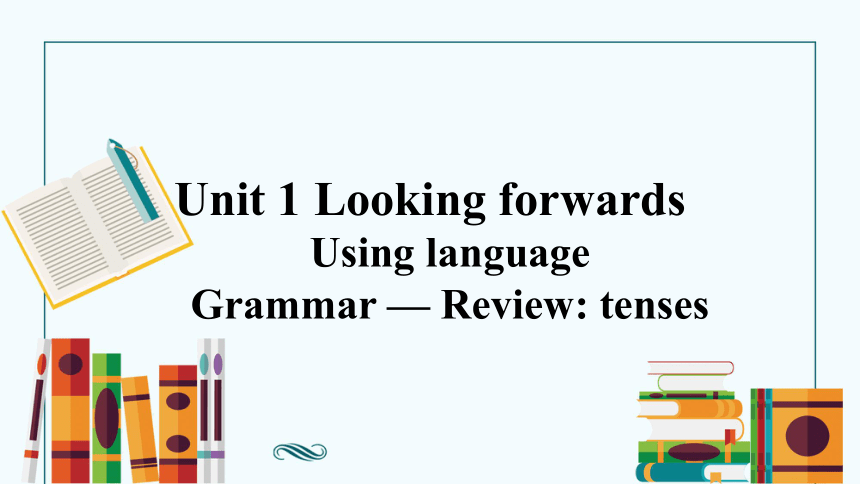 | |
| 格式 | pptx | ||
| 文件大小 | 20.1MB | ||
| 资源类型 | 教案 | ||
| 版本资源 | 外研版(2019) | ||
| 科目 | 英语 | ||
| 更新时间 | 2024-04-30 23:09:08 | ||
图片预览

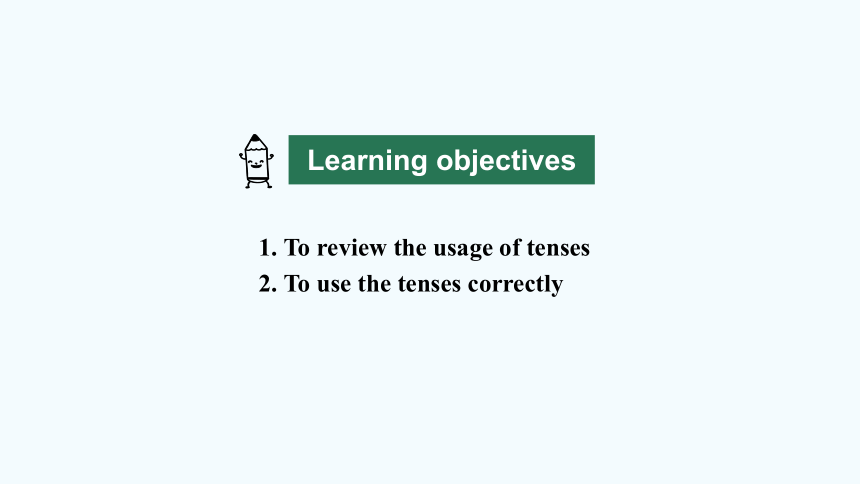
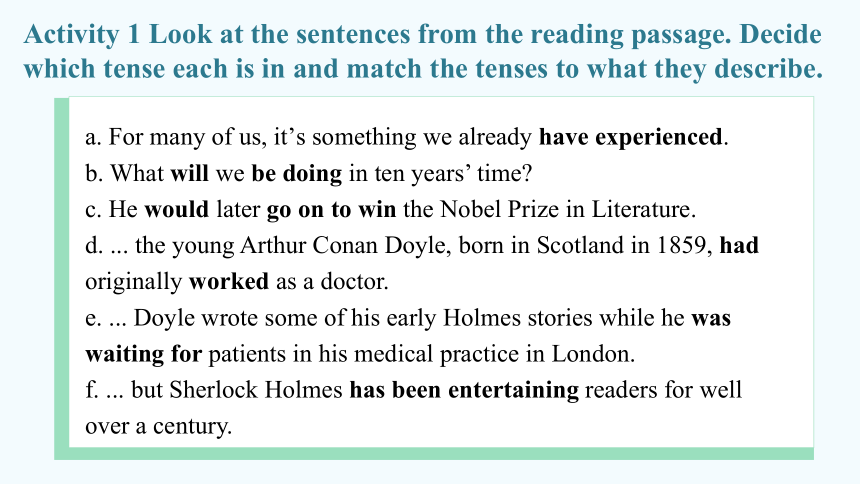
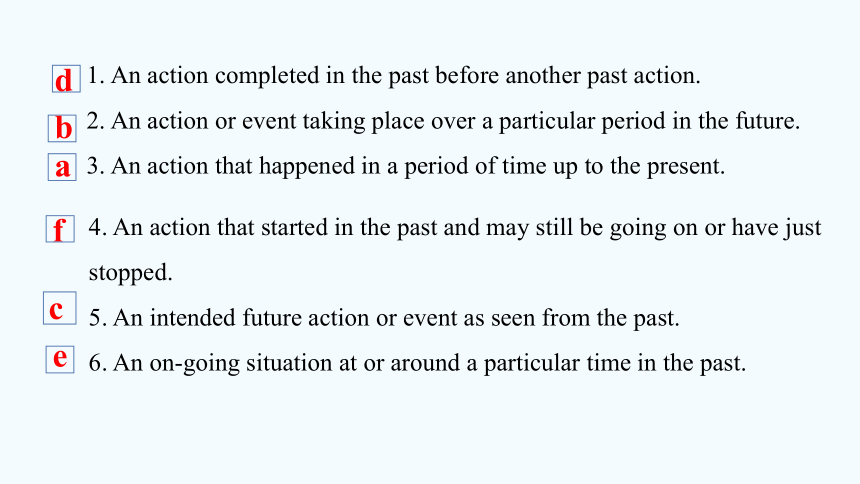

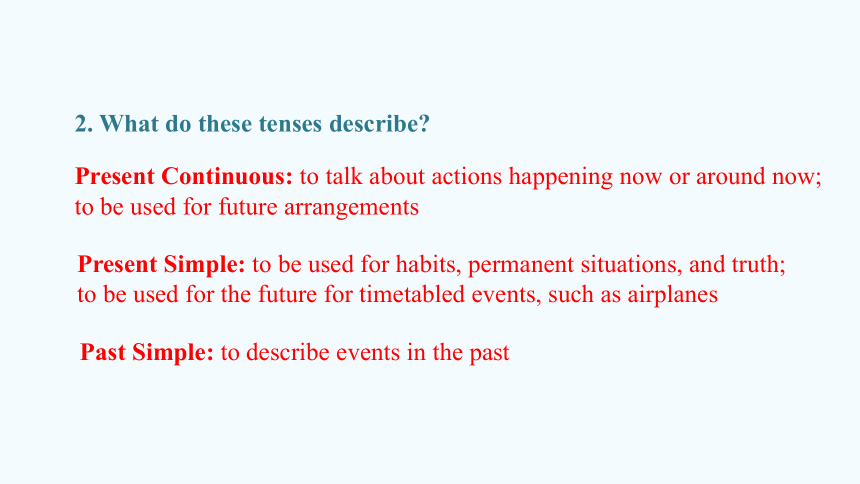
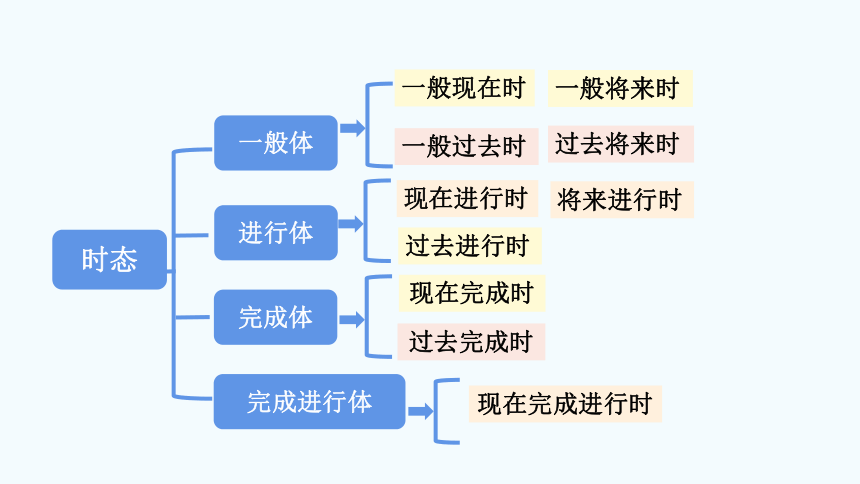
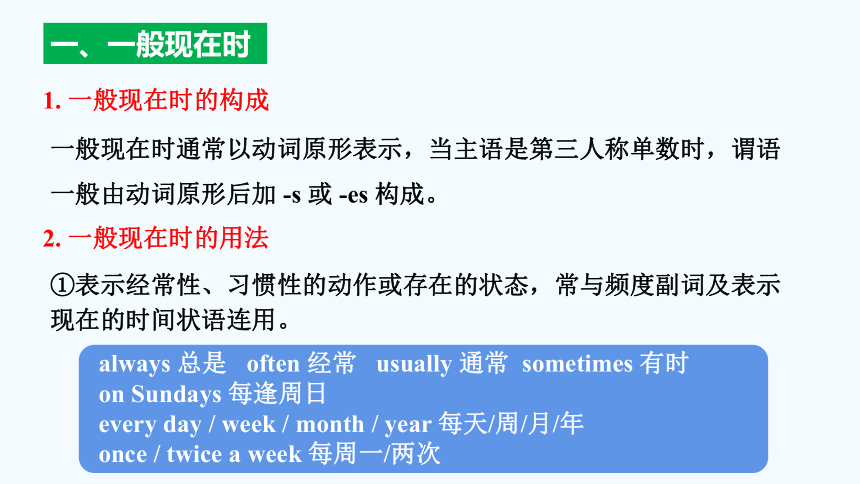
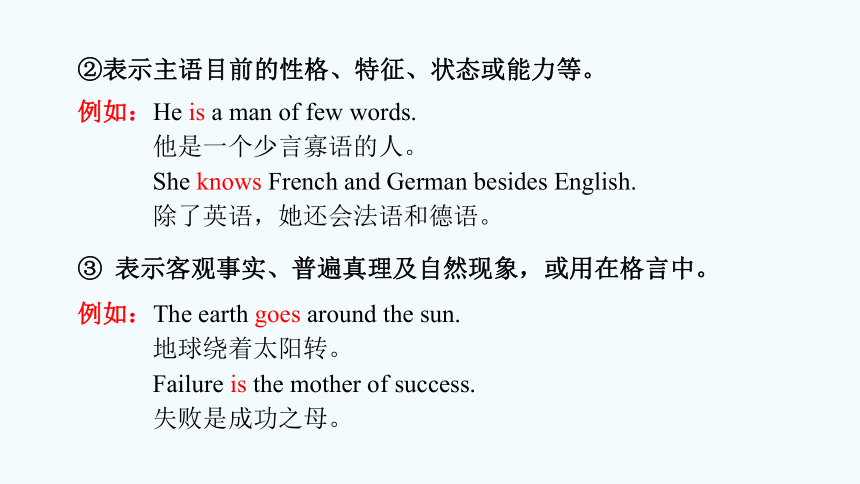
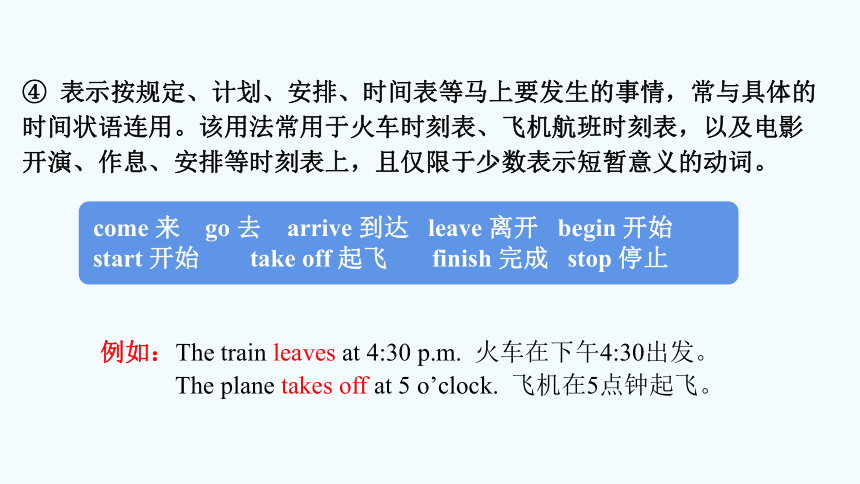
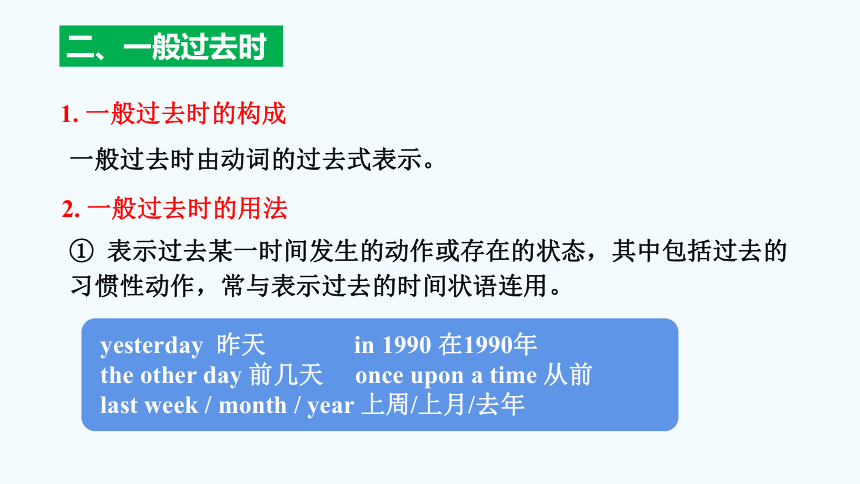
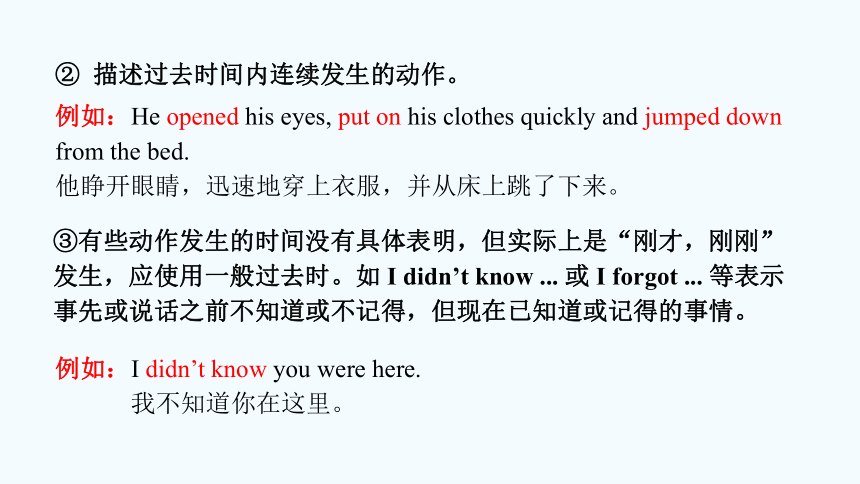
文档简介
(共35张PPT)
Using language
Grammar — Review: tenses
Unit 1 Looking forwards
Learning objectives
1. To review the usage of tenses
2. To use the tenses correctly
Activity 1 Look at the sentences from the reading passage. Decide which tense each is in and match the tenses to what they describe.
a. For many of us, it’s something we already have experienced.
b. What will we be doing in ten years’ time
c. He would later go on to win the Nobel Prize in Literature.
d. ... the young Arthur Conan Doyle, born in Scotland in 1859, had originally worked as a doctor.
e. ... Doyle wrote some of his early Holmes stories while he was waiting for patients in his medical practice in London.
f. ... but Sherlock Holmes has been entertaining readers for well over a century.
1. An action completed in the past before another past action.
2. An action or event taking place over a particular period in the future.
3. An action that happened in a period of time up to the present.
a
b
d
4. An action that started in the past and may still be going on or have just stopped.
5. An intended future action or event as seen from the past.
6. An on-going situation at or around a particular time in the past.
f
c
e
1. What other tenses have you learnt Find examples in the reading passage.
①One moment, we are lying comfortably in bed, about to fall into a deep sleep.
②... we find ourselves wondering or even worrying about possibly the most important issue of our life
③Although they shared the same ambitious and energetic approach to life, ...
(Present Continuous)
(Present Simple)
(Past Simple )
Now answer the questions.
2. What do these tenses describe
Present Continuous: to talk about actions happening now or around now; to be used for future arrangements
Present Simple: to be used for habits, permanent situations, and truth; to be used for the future for timetabled events, such as airplanes
Past Simple: to describe events in the past
一般体
进行体
完成体
完成进行体
时态
一般现在时
一般过去时
一般将来时
过去将来时
现在进行时
过去进行时
将来进行时
现在完成时
过去完成时
现在完成进行时
1. 一般现在时的构成
一、一般现在时
一般现在时通常以动词原形表示,当主语是第三人称单数时,谓语一般由动词原形后加 -s 或 -es 构成。
2. 一般现在时的用法
①表示经常性、习惯性的动作或存在的状态,常与频度副词及表示现在的时间状语连用。
always 总是 often 经常 usually 通常 sometimes 有时
on Sundays 每逢周日
every day / week / month / year 每天/周/月/年
once / twice a week 每周一/两次
②表示主语目前的性格、特征、状态或能力等。
例如:He is a man of few words.
他是一个少言寡语的人。
She knows French and German besides English.
除了英语,她还会法语和德语。
③ 表示客观事实、普遍真理及自然现象,或用在格言中。
例如:The earth goes around the sun.
地球绕着太阳转。
Failure is the mother of success.
失败是成功之母。
④ 表示按规定、计划、安排、时间表等马上要发生的事情,常与具体的时间状语连用。该用法常用于火车时刻表、飞机航班时刻表,以及电影开演、作息、安排等时刻表上,且仅限于少数表示短暂意义的动词。
come 来 go 去 arrive 到达 leave 离开 begin 开始
start 开始 take off 起飞 finish 完成 stop 停止
例如:The train leaves at 4:30 p.m. 火车在下午4:30出发。
The plane takes off at 5 o’clock. 飞机在5点钟起飞。
1. 一般过去时的构成
一般过去时由动词的过去式表示。
2. 一般过去时的用法
① 表示过去某一时间发生的动作或存在的状态,其中包括过去的习惯性动作,常与表示过去的时间状语连用。
yesterday 昨天 in 1990 在1990年
the other day 前几天 once upon a time 从前
last week / month / year 上周/上月/去年
二、一般过去时
② 描述过去时间内连续发生的动作。
例如:He opened his eyes, put on his clothes quickly and jumped down from the bed.
他睁开眼睛,迅速地穿上衣服,并从床上跳了下来。
例如:I didn’t know you were here.
我不知道你在这里。
③有些动作发生的时间没有具体表明,但实际上是“刚才,刚刚” 发生,应使用一般过去时。如 I didn’t know ... 或 I forgot ... 等表示事先或说话之前不知道或不记得,但现在已知道或记得的事情。
一般将来时的构成和用法
①表示将要发生的动作或将来存在的状态,shall 一般用于第一人称,will 可用于各种人称,常与表示将来的时间状语连用。
1. will / shall + 动词原形
tomorrow 明天 in the future 将来
later on 后来 the day after tomorrow 后天
next week / month / year 下周/下个月/明年
②will 还可表示说话时临时作出的决定。
例如:— Shall I order a taxi for Sarah to go to the airport tonight
— Don’t bother. I’ll drive her there.
三、一般将来时
表示按计划、打算要做某事;还可表示“预见”,即某种迹象预示着要发生某事。
2. be going to + 动词原形
例如:
Whether in the home or the workplace, social robots are going to become a lot more common in the next few years.
无论是在家里还是在工作场所,未来的几年里社交机器人将会变得更加普遍。
表示按计划、约定或按职责、义务必须做的事或即将发生的动作。
3. be to + 动词原形
例如:The highway is to be opened in May.
这条高速公路将在5月份开放。
You are to hand in your papers by 10 o’clock.
10点前你们得上交论文。
表示立即要发生的动作,常译作“即将……;马上就……”,通常不与具体的时间状语连用。
4. be about to + 动词原形
例如:Work was about to start on a new factory building.
新厂房即将动工。
过去将来时表示从过去某一时间看将要发生的动作或存在的状态,常用于宾语从句中。主要形式有:
① should / would + 动词原形
例如:He said that the meeting would begin at half past nine this morning.
他说会议将在今天上午九点半开始。
四、过去将来时
② was / were going to + 动词原形
例如:I was told that he was going to return home.
有人告诉我他打算回家。
③ was / were to + 动词原形
例如:She said she was to get married next month.
她说她计划下个月结婚。
④ was / were about to + 动词原形
例如:The train was about to leave. 火车就要开了。
1. 现在进行时的构成
am / is / are + 现在分词
2. 现在进行时的用法
① 表示说话时正在发生或进行的动作,或现阶段一直进行着的动作,常与一些标志性的时间状语连用。
例如:The workers are building a garden these days.
工人们这些日子一直在修建一个花园。
五、现在进行时
② 一些非延续性动词可用现在进行时表示按计划、安排将要发生的动作,常见的这类动词有:
例如:We are moving to a new house.
我们将要搬进一所新房子里。
come 来 go 去 leave 离开 arrive 到达 begin 开始
start 开始 return 返回 move 移动 take 拿走
1. 过去进行时的构成
was / were + 现在分词
2. 过去进行时的用法
① 表示过去某一时刻正在发生的动作,或过去某一个阶段内一直在进行的动作,常用的时间状语有:
at this / that time + 过去时间 at ... o’clock + 过去时间
from ... to ... + 过去时间 those days 那些日子
just now 刚才;刚刚
六、过去进行时
②表示一个过去的动作正在进行时,另一个过去的动作发生了,常与 when, while 引导的时间状语从句连用。
例如:My brother fell while he was riding his bicycle yesterday.
我弟弟昨天骑自行车时从车上掉下来了。
③一些非延续性动词可用过去进行时表示过去按计划、安排将要发生的动作,多用于从句中。常见的该类动词有:
例如:He said he was starting tomorrow.
他说他打算明天出发。
come 来 go 去 leave 离开 arrive 到达
start 开始 return 返回 begin 开始
1. 将来进行时的构成
will / shall be + 现在分词
2. 将来进行时的用法
表示将来某一时刻或某一段时间里正在进行的动作,常与一些标志性的时间状语连用。
例如:
I feel so excited! At this time tomorrow morning I will be flying to Shanghai. 我太激动了!明天早上此时我将飞往上海。
七、将来进行时
1. 现在完成时的构成
have / has + 过去分词
2. 现在完成时的用法
①表示动作或过程发生在说话之前某个没有明确说出的过去时间,但现在已经完成,且其结果对现在仍有影响。常用的时间状语有:
lately 近来 recently 最近 so far 到目前为止 up to / till now 直到现在 by now 到现在 in the last / past few days / years 在过去的几天/几年里
八、现在完成时
②表示从过去开始一直持续到现在的动作或状态,可能还会继续进行下去,常用的时间状语有:
例如:
His first novel has received good reviews since it came out last month.
他的首部小说自上个月出版以来获得了许多好评。
He has taught Chinese for more than 20 years.
他教中文已有20多年了。
since + 时间点/从句 for + 时间段
例如:他已经参军三年了。
He joined the army three years ago.
He has been a soldier for three years.
He has been in the army for three years.
注意:
瞬间动词可以用于现在完成时,但在肯定句中不能与表示一段时间的状语连用。常用的瞬间动词有:go, come, arrive, leave, begin, borrow, buy, die, fall, stop, start, kill, close, join 等。
1. 过去完成时的构成
had + 过去分词
2. 过去完成时的用法
①表示在过去某一时间或过去某一事件之前已经发生并完成的动作,即“过去的过去”。
例如:The film had begun when we got to the cinema yesterday.
昨天我们到达电影院时,电影已经开始了。
九、过去完成时
② 表示一个动作或状态从过去某一时间之前已经开始,一直持续到过去这一时刻,并也可能继续下去。常用的时间状语有:
by then 到那时为止 by that time 到那时候
before... 在……之前 by the end of 到……末为止
until then 直到那时
by the time + 一般过去时的从句 到……时候
例如:
By the time Jack returned home from England, his son had graduated from college.
杰克从英格兰回到家中时,他的儿子已大学毕业。
③ intend, mean, hope, want, plan, suppose, expect, think等动词的过去完成时,可表示过去未曾实现的愿望或想法等。
例如:
I had intended to call on you yesterday, but I had an unexpected visitor.
我本来打算昨天去看你的,但我这边来了一个不速之客。(实际上没去)
1. 现在完成进行时的构成
have / has been + 现在分词
2. 现在完成进行时的用法
表示从过去某一时刻开始,一直持续到现在的动作。这一动作可能刚完成,也可能仍在进行。常用的时间状语有:
all this morning 整个早上 recently 最近 this month 这个月 these few days 这几天 since ... 自从……
例如:
Tom has been working in the library every night over the last three months.
十、现在完成进行时
Activity 2 Complete the blog with the correct form of the verbs in brackets.
I woke at dawn again and already the birds 1 ___________ (sing). In the coming days, we 2 ________________ (paint) the toilet block that we had been building over the last two months.
were singing
would be painting
I 3 _______________________________ (live) in this Cambodian village for two months. Despite the hard physical work,
I 4 _____________________________(not regret) for one moment choosing to spend my gap year as a volunteer for the Cambodia Foundation. It is wonderful to meet such friendly local people who are happy to share their lives with us.
have been living / have lived
don’t regret / haven’t regretted
I 5______ (feel) happy and free of worries. And of course,
I 6 __________________________ (become) fitter. This gap year has been a fantastic opportunity for my personal growth, and I surely
7 ____________ (continue) to learn about how other people live their lives after it ends.
feel
have become / am becoming
will continue
Activity 3 Work in pairs. Read the profile and talk about David’s life using different tenses where appropriate.
David Mason
PERSONAL INFORMATION
Date of Birth: 20 June 2001
Nationality: British
EDUCATION
2007-2013 Carson Primary School
2013-2019 Wildwood High School
EXTRACURRICULAR EXPERIENCE
Sept 2017 first prize for school science project
Apr-Oct 2018 exchange programme in China
FUTURE PLANS
Julia2019-present gap year in Cambodia
undergraduate study at Newcastle University
chemical engineer after graduation
voluntary work to help people in need
David Mason
Activity 4 Work in pairs. Interview each other about your past experience and future plans. Share them with the class using different tenses where appropriate.
1. Review the usage of tenses and do the relevant exercises.
2. Make up an interview using the words and expressions you’ve learnt today.
Homework
Using language
Grammar — Review: tenses
Unit 1 Looking forwards
Learning objectives
1. To review the usage of tenses
2. To use the tenses correctly
Activity 1 Look at the sentences from the reading passage. Decide which tense each is in and match the tenses to what they describe.
a. For many of us, it’s something we already have experienced.
b. What will we be doing in ten years’ time
c. He would later go on to win the Nobel Prize in Literature.
d. ... the young Arthur Conan Doyle, born in Scotland in 1859, had originally worked as a doctor.
e. ... Doyle wrote some of his early Holmes stories while he was waiting for patients in his medical practice in London.
f. ... but Sherlock Holmes has been entertaining readers for well over a century.
1. An action completed in the past before another past action.
2. An action or event taking place over a particular period in the future.
3. An action that happened in a period of time up to the present.
a
b
d
4. An action that started in the past and may still be going on or have just stopped.
5. An intended future action or event as seen from the past.
6. An on-going situation at or around a particular time in the past.
f
c
e
1. What other tenses have you learnt Find examples in the reading passage.
①One moment, we are lying comfortably in bed, about to fall into a deep sleep.
②... we find ourselves wondering or even worrying about possibly the most important issue of our life
③Although they shared the same ambitious and energetic approach to life, ...
(Present Continuous)
(Present Simple)
(Past Simple )
Now answer the questions.
2. What do these tenses describe
Present Continuous: to talk about actions happening now or around now; to be used for future arrangements
Present Simple: to be used for habits, permanent situations, and truth; to be used for the future for timetabled events, such as airplanes
Past Simple: to describe events in the past
一般体
进行体
完成体
完成进行体
时态
一般现在时
一般过去时
一般将来时
过去将来时
现在进行时
过去进行时
将来进行时
现在完成时
过去完成时
现在完成进行时
1. 一般现在时的构成
一、一般现在时
一般现在时通常以动词原形表示,当主语是第三人称单数时,谓语一般由动词原形后加 -s 或 -es 构成。
2. 一般现在时的用法
①表示经常性、习惯性的动作或存在的状态,常与频度副词及表示现在的时间状语连用。
always 总是 often 经常 usually 通常 sometimes 有时
on Sundays 每逢周日
every day / week / month / year 每天/周/月/年
once / twice a week 每周一/两次
②表示主语目前的性格、特征、状态或能力等。
例如:He is a man of few words.
他是一个少言寡语的人。
She knows French and German besides English.
除了英语,她还会法语和德语。
③ 表示客观事实、普遍真理及自然现象,或用在格言中。
例如:The earth goes around the sun.
地球绕着太阳转。
Failure is the mother of success.
失败是成功之母。
④ 表示按规定、计划、安排、时间表等马上要发生的事情,常与具体的时间状语连用。该用法常用于火车时刻表、飞机航班时刻表,以及电影开演、作息、安排等时刻表上,且仅限于少数表示短暂意义的动词。
come 来 go 去 arrive 到达 leave 离开 begin 开始
start 开始 take off 起飞 finish 完成 stop 停止
例如:The train leaves at 4:30 p.m. 火车在下午4:30出发。
The plane takes off at 5 o’clock. 飞机在5点钟起飞。
1. 一般过去时的构成
一般过去时由动词的过去式表示。
2. 一般过去时的用法
① 表示过去某一时间发生的动作或存在的状态,其中包括过去的习惯性动作,常与表示过去的时间状语连用。
yesterday 昨天 in 1990 在1990年
the other day 前几天 once upon a time 从前
last week / month / year 上周/上月/去年
二、一般过去时
② 描述过去时间内连续发生的动作。
例如:He opened his eyes, put on his clothes quickly and jumped down from the bed.
他睁开眼睛,迅速地穿上衣服,并从床上跳了下来。
例如:I didn’t know you were here.
我不知道你在这里。
③有些动作发生的时间没有具体表明,但实际上是“刚才,刚刚” 发生,应使用一般过去时。如 I didn’t know ... 或 I forgot ... 等表示事先或说话之前不知道或不记得,但现在已知道或记得的事情。
一般将来时的构成和用法
①表示将要发生的动作或将来存在的状态,shall 一般用于第一人称,will 可用于各种人称,常与表示将来的时间状语连用。
1. will / shall + 动词原形
tomorrow 明天 in the future 将来
later on 后来 the day after tomorrow 后天
next week / month / year 下周/下个月/明年
②will 还可表示说话时临时作出的决定。
例如:— Shall I order a taxi for Sarah to go to the airport tonight
— Don’t bother. I’ll drive her there.
三、一般将来时
表示按计划、打算要做某事;还可表示“预见”,即某种迹象预示着要发生某事。
2. be going to + 动词原形
例如:
Whether in the home or the workplace, social robots are going to become a lot more common in the next few years.
无论是在家里还是在工作场所,未来的几年里社交机器人将会变得更加普遍。
表示按计划、约定或按职责、义务必须做的事或即将发生的动作。
3. be to + 动词原形
例如:The highway is to be opened in May.
这条高速公路将在5月份开放。
You are to hand in your papers by 10 o’clock.
10点前你们得上交论文。
表示立即要发生的动作,常译作“即将……;马上就……”,通常不与具体的时间状语连用。
4. be about to + 动词原形
例如:Work was about to start on a new factory building.
新厂房即将动工。
过去将来时表示从过去某一时间看将要发生的动作或存在的状态,常用于宾语从句中。主要形式有:
① should / would + 动词原形
例如:He said that the meeting would begin at half past nine this morning.
他说会议将在今天上午九点半开始。
四、过去将来时
② was / were going to + 动词原形
例如:I was told that he was going to return home.
有人告诉我他打算回家。
③ was / were to + 动词原形
例如:She said she was to get married next month.
她说她计划下个月结婚。
④ was / were about to + 动词原形
例如:The train was about to leave. 火车就要开了。
1. 现在进行时的构成
am / is / are + 现在分词
2. 现在进行时的用法
① 表示说话时正在发生或进行的动作,或现阶段一直进行着的动作,常与一些标志性的时间状语连用。
例如:The workers are building a garden these days.
工人们这些日子一直在修建一个花园。
五、现在进行时
② 一些非延续性动词可用现在进行时表示按计划、安排将要发生的动作,常见的这类动词有:
例如:We are moving to a new house.
我们将要搬进一所新房子里。
come 来 go 去 leave 离开 arrive 到达 begin 开始
start 开始 return 返回 move 移动 take 拿走
1. 过去进行时的构成
was / were + 现在分词
2. 过去进行时的用法
① 表示过去某一时刻正在发生的动作,或过去某一个阶段内一直在进行的动作,常用的时间状语有:
at this / that time + 过去时间 at ... o’clock + 过去时间
from ... to ... + 过去时间 those days 那些日子
just now 刚才;刚刚
六、过去进行时
②表示一个过去的动作正在进行时,另一个过去的动作发生了,常与 when, while 引导的时间状语从句连用。
例如:My brother fell while he was riding his bicycle yesterday.
我弟弟昨天骑自行车时从车上掉下来了。
③一些非延续性动词可用过去进行时表示过去按计划、安排将要发生的动作,多用于从句中。常见的该类动词有:
例如:He said he was starting tomorrow.
他说他打算明天出发。
come 来 go 去 leave 离开 arrive 到达
start 开始 return 返回 begin 开始
1. 将来进行时的构成
will / shall be + 现在分词
2. 将来进行时的用法
表示将来某一时刻或某一段时间里正在进行的动作,常与一些标志性的时间状语连用。
例如:
I feel so excited! At this time tomorrow morning I will be flying to Shanghai. 我太激动了!明天早上此时我将飞往上海。
七、将来进行时
1. 现在完成时的构成
have / has + 过去分词
2. 现在完成时的用法
①表示动作或过程发生在说话之前某个没有明确说出的过去时间,但现在已经完成,且其结果对现在仍有影响。常用的时间状语有:
lately 近来 recently 最近 so far 到目前为止 up to / till now 直到现在 by now 到现在 in the last / past few days / years 在过去的几天/几年里
八、现在完成时
②表示从过去开始一直持续到现在的动作或状态,可能还会继续进行下去,常用的时间状语有:
例如:
His first novel has received good reviews since it came out last month.
他的首部小说自上个月出版以来获得了许多好评。
He has taught Chinese for more than 20 years.
他教中文已有20多年了。
since + 时间点/从句 for + 时间段
例如:他已经参军三年了。
He joined the army three years ago.
He has been a soldier for three years.
He has been in the army for three years.
注意:
瞬间动词可以用于现在完成时,但在肯定句中不能与表示一段时间的状语连用。常用的瞬间动词有:go, come, arrive, leave, begin, borrow, buy, die, fall, stop, start, kill, close, join 等。
1. 过去完成时的构成
had + 过去分词
2. 过去完成时的用法
①表示在过去某一时间或过去某一事件之前已经发生并完成的动作,即“过去的过去”。
例如:The film had begun when we got to the cinema yesterday.
昨天我们到达电影院时,电影已经开始了。
九、过去完成时
② 表示一个动作或状态从过去某一时间之前已经开始,一直持续到过去这一时刻,并也可能继续下去。常用的时间状语有:
by then 到那时为止 by that time 到那时候
before... 在……之前 by the end of 到……末为止
until then 直到那时
by the time + 一般过去时的从句 到……时候
例如:
By the time Jack returned home from England, his son had graduated from college.
杰克从英格兰回到家中时,他的儿子已大学毕业。
③ intend, mean, hope, want, plan, suppose, expect, think等动词的过去完成时,可表示过去未曾实现的愿望或想法等。
例如:
I had intended to call on you yesterday, but I had an unexpected visitor.
我本来打算昨天去看你的,但我这边来了一个不速之客。(实际上没去)
1. 现在完成进行时的构成
have / has been + 现在分词
2. 现在完成进行时的用法
表示从过去某一时刻开始,一直持续到现在的动作。这一动作可能刚完成,也可能仍在进行。常用的时间状语有:
all this morning 整个早上 recently 最近 this month 这个月 these few days 这几天 since ... 自从……
例如:
Tom has been working in the library every night over the last three months.
十、现在完成进行时
Activity 2 Complete the blog with the correct form of the verbs in brackets.
I woke at dawn again and already the birds 1 ___________ (sing). In the coming days, we 2 ________________ (paint) the toilet block that we had been building over the last two months.
were singing
would be painting
I 3 _______________________________ (live) in this Cambodian village for two months. Despite the hard physical work,
I 4 _____________________________(not regret) for one moment choosing to spend my gap year as a volunteer for the Cambodia Foundation. It is wonderful to meet such friendly local people who are happy to share their lives with us.
have been living / have lived
don’t regret / haven’t regretted
I 5______ (feel) happy and free of worries. And of course,
I 6 __________________________ (become) fitter. This gap year has been a fantastic opportunity for my personal growth, and I surely
7 ____________ (continue) to learn about how other people live their lives after it ends.
feel
have become / am becoming
will continue
Activity 3 Work in pairs. Read the profile and talk about David’s life using different tenses where appropriate.
David Mason
PERSONAL INFORMATION
Date of Birth: 20 June 2001
Nationality: British
EDUCATION
2007-2013 Carson Primary School
2013-2019 Wildwood High School
EXTRACURRICULAR EXPERIENCE
Sept 2017 first prize for school science project
Apr-Oct 2018 exchange programme in China
FUTURE PLANS
Julia2019-present gap year in Cambodia
undergraduate study at Newcastle University
chemical engineer after graduation
voluntary work to help people in need
David Mason
Activity 4 Work in pairs. Interview each other about your past experience and future plans. Share them with the class using different tenses where appropriate.
1. Review the usage of tenses and do the relevant exercises.
2. Make up an interview using the words and expressions you’ve learnt today.
Homework
